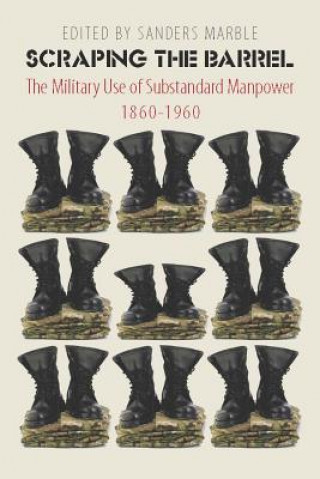
Kód: 04941196
Scraping the Barrel
Autor Sanders Marble
It is a truism that history is written by the victors, and perhaps doubly so of military history, where the tendency is to relate the biggest battles, the most victorious and heroic deeds, the very best (or worst) of men. This boo ... celý popis
- Jazyk:
 Angličtina
Angličtina - Väzba: Brožovaná
- Počet strán: 372
Nakladateľ: Fordham University Press, 2012
- Viac informácií o knihe

46.29 €
Bežne: 51.45 €
Ušetríte 5.16 €

Skladom u dodávateľa v malom množstve
Odosielame za 14 - 18 dní
Potrebujete viac kusov?Ak máte záujem o viac kusov, preverte, prosím, najprv dostupnosť titulu na našej zákazníckej podpore.
Pridať medzi želanie
Mohlo by sa vám tiež páčiť
-

Eyelike Stickers: Baby Animals
6.03 € -19 % -

Phantoms in the Brain
14.43 € -23 % -

Writings of Carlos Fuentes
29.39 € -

Violence
57.86 € -

American Lesson
23.65 € -

RHCSA Red Hat Enterprise Linux 9
55.51 € -

Paral L Z U Importa Ierobe Ojumi Eiropas Savien B
64.83 €
Darčekový poukaz: Radosť zaručená
- Darujte poukaz v ľubovoľnej hodnote, a my sa postaráme o zvyšok.
- Poukaz sa vzťahuje na všetky produkty v našej ponuke.
- Elektronický poukaz si vytlačíte z e-mailu a môžete ho ihneď darovať.
- Platnosť poukazu je 12 mesiacov od dátumu vystavenia.
Viac informácií o knihe Scraping the Barrel
Nákupom získate 114 bodov
 Anotácia knihy
Anotácia knihy
It is a truism that history is written by the victors, and perhaps doubly so of military history, where the tendency is to relate the biggest battles, the most victorious and heroic deeds, the very best (or worst) of men. This book stands as a corrective to this belief. Scraping the Barrel covers ten cases of how armies have used sub-standard manpower in wars from 1860 to the 1960s. Dennis Showalter and Andre Lambelet look at the changing standards in Germany and France leading up to World War I, while Peter Simkins chronicles what happened with the 'Bantams,' special units of short men used by Britain in the Great War. Often the use of substandard men was to answer the sheer need for manpower in brutal, lasting conflicts, as Paul A. Cimbala writes of the U.S. Veteran Reserve Corps in the Civil War, or to keep war-damaged men active; sometimes this ethos was used to include men who wanted to fight but who otherwise would have been excluded, as Steven W. Short writes of the U.S. Colored troops in the First World War. In the Second World War it was to answer more dire exigencies, as David Glantz relates how the USSR, having suffered enormous losses, threw away many pre-war standards, reaching for women, ethnic/national minorities, and political prisoners alike to fill units. Likewise, Nazi Germany, facing many fronts and a finite manpower pool, was compelled to relax both physical and racial standards, and Walter Dunn and Valdis Lumans look at these changing policies as well as the battlefield performance of these men. In relating the stories of the sub-standard (for the military), Scraping the Barrel is also a humanist history of the military, of the more average men who have served their country and how they were put to use. It throws light on how militaries' ideas of fitness reflect the underlying views of their societies. The idea of "disability" has been constructed based on a variety of physical, yes, but also social standards: as a value judgment on groups viewed as lesser - the aged, the lower classes, and those of different races and ethnic identities. From the American Civil War, through World Wars I and II, through the U.S. Project 100,000 in the Cold War, sub-standard men have been mobilized, served, and fought for their countries. These men are the inverse of the elites that get the lion's share of our attention. This is their untold history.
 Parametre knihy
Parametre knihy
Zaradenie knihy Knihy po anglicky Humanities History Regional & national history
46.29 €
- Celý názov: Scraping the Barrel
- Podnázov: The Military Use of Substandard Manpower, 1860-1960
- Autor: Sanders Marble
- Jazyk:
 Angličtina
Angličtina - Väzba: Brožovaná
- Počet strán: 372
- EAN: 9780823239788
- ISBN: 0823239780
- ID: 04941196
- Nakladateľ: Fordham University Press
- Hmotnosť: 499 g
- Rozmery: 229 × 152 × 23 mm
- Dátum vydania: 14. August 2012
Obľúbené z iného súdka
-

Hundred Years' War on Palestine
12.08 € -24 % -

Ten Myths About Israel
12.59 € -16 % -

Strange Death of Europe
16.58 € -16 % -

Rise And Fall Of The Third Reich
22.01 € -23 % -

Citizens
22.01 € -23 % -

Last Voyage of the Lusitania
20.68 € -

Voynich Manuscript
41.27 € -

Moshe Dayan
27.34 € -9 % -

The Fourth Turning
20.68 € -1 % -

General's Son
20.27 € -4 % -

Reverence for Wood
9.21 € -19 % -

Yitzhak Rabin
16.58 € -10 % -

Hell's Cartel
21.19 € -13 % -

Interpreting Our Heritage
30.21 € -

Paradise Lost
12.79 € -24 % -

Games without Rules
19.25 € -6 % -

Voices of the Foreign Legion
17.40 € -5 % -

American Nations
16.69 € -14 % -

Lynching in the New South
34.30 € -

City of Fortune
14.43 € -23 % -

Thirteenth Tribe
16.89 € -

Twilight of the Romanovs
38.20 € -23 % -

Habsburg Monarchy 1809-1918
16.58 € -23 % -

Ethnic Cleansing of Palestine
14.43 € -23 % -

Decline and Fall of the Roman Empire
5.93 € -21 % -

Palestine
20.27 € -21 % -

The Secret Diaries Of Miss Anne Lister: Vol. 1
13.61 € -14 % -

Giza Power Plant
16.07 € -16 % -

The Balkans, 1804-2012
22.01 € -23 % -

Age Of Revolution
16.58 € -23 % -

Millennium
13.20 € -24 % -

Alexiad
17.81 € -20 % -

Heraclius, Emperor of Byzantium
33.38 € -18 % -

1948
24.68 € -10 % -

Annals of Imperial Rome
14.43 € -23 % -

Strike and Hold
30 € -3 % -

Diana: Her True Story - In Her Own Words
11.05 € -23 % -

How to be a Victorian
14.43 € -23 % -

The Oxford History of Ancient Egypt
15.46 € -23 % -

Londoners
11.26 € -25 % -

History of Japan
16.48 € -18 % -

Illustrated Encyclopedia of Uniforms of the American War of Independence
22.01 € -23 % -

Olympic, Titanic, Britannic
30.31 € -15 % -

Medieval Monsters
11.15 € -23 % -

Secret History
12.28 € -23 % -

The Thirteenth Tribe
12.69 € -

Footnotes in Gaza
27.34 € -13 % -

Biggest Prison on Earth
14.43 € -23 % -

Great Gatsby (Wisehouse Classics Edition)
16.17 € -37 %
Osobný odber Bratislava a 2642 dalších
Copyright ©2008-24 najlacnejsie-knihy.sk Všetky práva vyhradenéSúkromieCookies


 21 miliónov titulov
21 miliónov titulov Vrátenie do mesiaca
Vrátenie do mesiaca 02/210 210 99 (8-15.30h)
02/210 210 99 (8-15.30h)